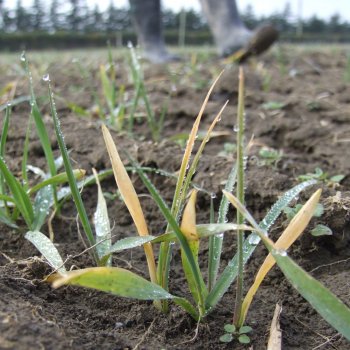
These treatments are based on soil bacteria that have been isolated from New Zealand pastures and shown to kill grass grub. The grubs are significant pests in autumn sown cereal crops and crops that follow pastures in a rotation are particularly at risk when the pasture has harboured high numbers of grass grubs.
Insecticide seed treatments are common practice to protect seedlings against root feeding insects but many insecticides will be phased out in coming years so alternative solutions are needed for growers.
Microbial insecticides, or biopesticides, can be effective alternatives to chemical insecticides in many situations. Inoculation of seed with insecticidal microbes places the microbe close to the plant roots where the target pest feeds. This ensures rapid contact between the microbe and the pest. There is increasing interest globally in development of microbial seed treatments.
Programme leader, Maureen O’Callaghan, says that since 2012, FAR and AgResearch, with support from the Ministry of Primary Industry’s Sustainable Farming Fund, have been testing microbial treatments of wheat seed on commercial farms in Canterbury for their ability to protect seedlings from grass grub attack. “Seeds treated with insecticidal bacteria resulted in higher yields than untreated seeds where grass grub was present, and in some years these treatments were as effective as current insecticide seed treatments.”
“These trials have demonstrated that microbial seed treatments can protect cereal seedlings effectively from grass grub attack and suggest that further work and investment to scale-up microbial seed treatment processes is warranted.”
Source: AgResearch
Photo: Richard Chynoweth, FAR



 Classifieds
Classifieds

